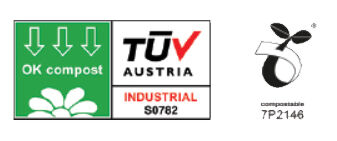Read in PDF
Why sugar cane is a good choice!
Sugarcane disposables and packaging are lightweight, very sturdy and suitable for both hot and cold applications. This type of material not only has a natural appearcane, but also contributes to a cleaner living environment for us and future generations. Compared to conventional plastics, the material is quickly renewable, there are reduced CO2 emissions, we become less dependent on fossil sources and we contribute to reducing the plastic waste problem. ![]() industrially compostable and/or HOME compostable
industrially compostable and/or HOME compostable ![]() rapidly renewable raw material
rapidly renewable raw material![]() suitable for both hot and cold applications
suitable for both hot and cold applications![]() suitable for the microwave
suitable for the microwave![]() made from residual waste
made from residual waste
The natural raw material
Sugar cane is an important crop that is mainly grown for the extraction of raw sugar. This crop mainly grows in subtropical and tropical regions of the world, such as Brazil, China and India. It is a strong crop, can whitstand some drought and offers strong resistance to diseases.

Harvest
The whole cycle of growing sugar cane can be done up to 3 times a year. The plant is cut a few centimeters above the ground without damaging the root. The plant then continues to grow and last for years to come. The sugar cane plant is therefore not only rapidly renewable, but also sustainable.
In the factory, the harvested sugar cane is processed by squeezing out the juice. After this process, plant fibres remain as a residual product, also known as 'bagasse'.

Residual waste is reused instead of incinerated
Normally, the agricultural residual flow (bagasse) would be burnt off, but can now be used as a natural raw material for sugar cane disposables. This way we prevent air pollution.

The disposables and packaging
The bagasse is collected in the factory, finely ground and then pulped. A mold is made of each packaging or disposables. The sugar cane pulp is then poured into this mold and pressed. This process is completely mechanical. Sugar can is usually available in a white and natural (light brown) variant. A bleaching process takes place to turn the sugar cane pulp white.

Packaging and disposables made from sugar cane are lightweight, very sturdy and suitable for both hot and cold applications. The material is also suitable for heating in the microwave.
Compostable and biodegradable
Packaging and disposables made from sugar cane are biodegradable and industrially compostable.
Biodegradable
The fact that sugar cane disposables are biodegradable means that they can be broken down naturally by fungi and bacteria. However, it says nothing about the speed at which this happens and under what circumstances. Ultimately, plastic is also biodegradable, but it takes a very long time to break down. Nor does it mean that a product can be converted into compost.
Compost
Composting is a method of processing organic waste. Bacteria, fungi, small insects - also called micro-organisms - feed on the solid waste and convert it into carbon dioxide, water and humus (biomass). Those micro-organisms need oxygen for this. That is why we speak of an aerobic process. In addition, a relatively high degree of humidity and a sufficiently high temperature are required for a good compostig process.
Industrial composting
In industrial composting, installations continously monitor and adjust the process. This speeds up composting considerably. In a few weeks (max. 12 weeks) the waste is converted into compost. It is also possible to invest in a composting machine yourself. In such a machine it only takes a few days.

HOME composting
It is also possible to compost some packaging on a compost heap. You are, among other things, dependent on weather conditions. Converting the waste into compost is much slower, especially in cold or dry weather.

Certifications - EN13432 industrial and HOME compostability
Packaging certified according to European standards EN13432 can be composted in industrial composting installations and smaller composting machines (at temperatures of 55 to 60°C).
Packaging certified according to European standardss EN13432 HOME can be composted on the home compost heap, at lower temperatures.
PFAS free
As of November 2022, our production of sugar cane products will be PFAS-free, we have had this tested and therefore show that our sugar cane products are PFAS-free. Just like the compostability certificates, this is included in our Declaration of Compliance per product (group). This is stated with every product on our website.

